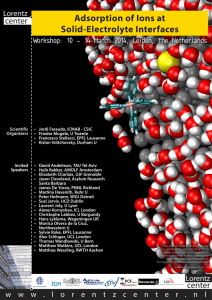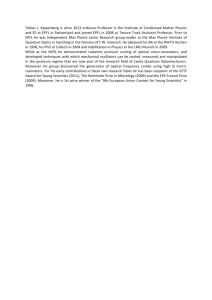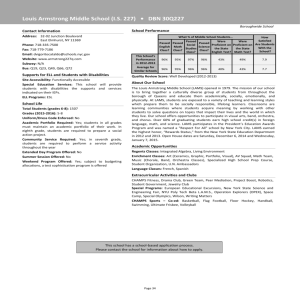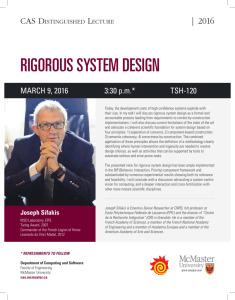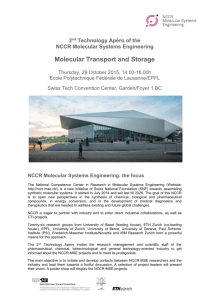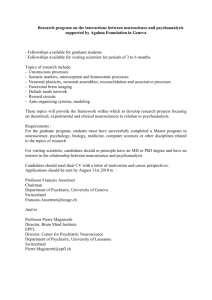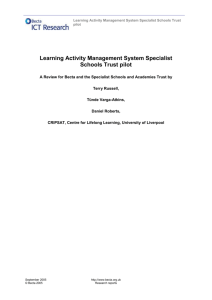old (used in the version
advertisement
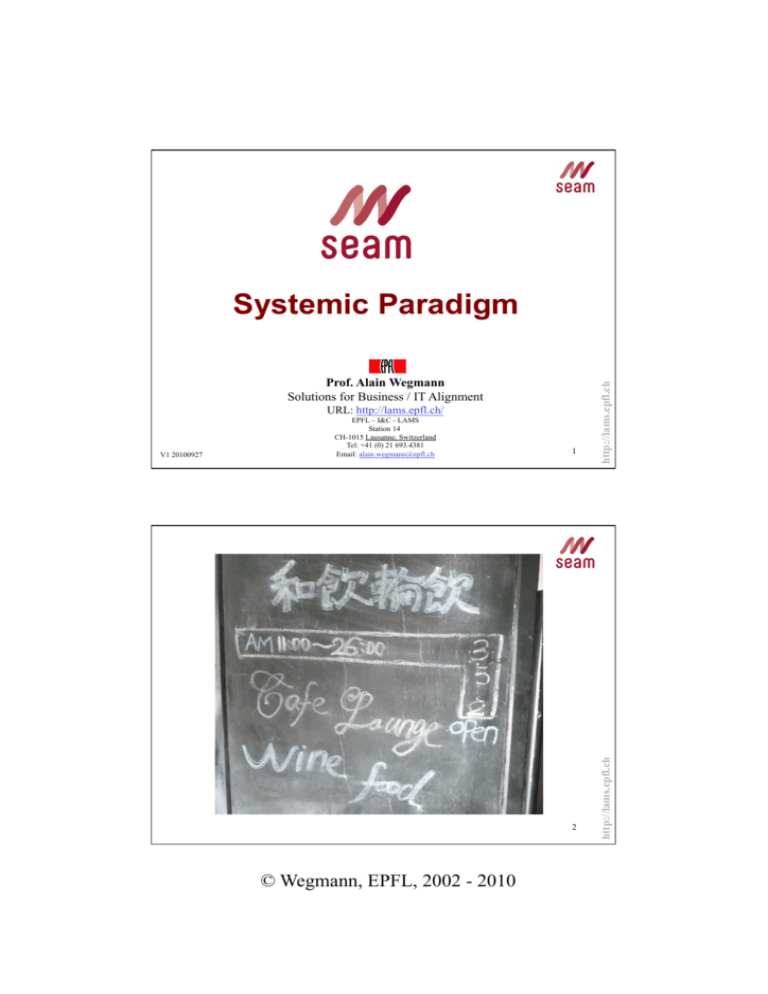
URL: http://lams.epfl.ch/ V1 20100927 EPFL – I&C - LAMS Station 14 CH-1015 Lausanne, Switzerland Tel: +41 (0) 21 693.4381 Email: alain.wegmann@epfl.ch 1 2 © Wegmann, EPFL, 2002 - 2010 http://lams.epfl.ch Prof. Alain Wegmann Solutions for Business / IT Alignment http://lams.epfl.ch Systemic Paradigm 3 http://lams.epfl.ch Cultural Principles Paradigm / Kühn • Paradigm : thought pattern (often implicit) • Science changes through paradigm changes and not evolution http://en.wikipedia.org/wiki/Paradigm http://en.wikipedia.org/wiki/Paradigm_shift 4 © Wegmann, EPFL, 2002 - 2010 http://lams.epfl.ch • Example: relativity, quantum physics Complex / Complicated http://www.scriptgodsmustdie.com 5 http://lams.epfl.ch http://www.neazoi.gr/ Paradigm Shift Mechanistic Paradigm (complicated) Systemic Paradigm (complex) • • • • • • • • • • • • Open systems Emergent properties Non-linear Largely non-predictable “Living” Involve humans http://en.wikipedia.org/wiki/Complex_system 6 © Wegmann, EPFL, 2002 - 2010 http://lams.epfl.ch Closed systems Non-emergent properties Linear Predictable “Mechanical”, man-made Involve technology SEAM Claim http://grandaspirations.org 7 http://lams.epfl.ch • To understand enterprise architecture, we must switch from a mechanistic view (often implicit) to a systemic view (explicit) 8 © Wegmann, EPFL, 2002 - 2010 http://lams.epfl.ch Systemic Paradigm 1. Systems Philosophy • 1.1 Systems epistemology – “philosophy”, linguistics, cognition • 1.2 Systems ontology • 1.3 Systems axiology – Aesthetics 9 http://lams.epfl.ch – logic 1.1 Epistemology • what knowledge is and how it can be acquired http://en.wikipedia.org/wiki/Epistemology 10 © Wegmann, EPFL, 2002 - 2010 http://lams.epfl.ch • branch of philosophy concerned with the nature and scope of knowledge, "theory of knowledge". What is this Form? 11 http://lams.epfl.ch • Fast change What is this Form? 12 © Wegmann, EPFL, 2002 - 2010 http://lams.epfl.ch • Less change What is this Form? 13 http://lams.epfl.ch • No Change? System Definition • System = set of interrelated entities 14 © Wegmann, EPFL, 2002 - 2010 http://lams.epfl.ch • System = set of interrelated entities that exhibit emergent propertiers perceived by an observer • Natural science consists of mental constructs that are constructed with the aim of explaining sensory experience (or measurements) of natural world. • Scientific knowledge is constructed by the scientific community, seeking to measure and construct models of the natural world. http://en.wikipedia.org/wiki/Constructivism http://en.wikipedia.org/wiki/Constructivist_epistemology 15 http://lams.epfl.ch Constructivism Principle Embodied Cognition http://commons.wikimedia.org/wiki/ File:CRS_(Police_française)_.jpg http://www.interet-general.info/ http://www.contrepoints.org/ 2011/10/24/ 51941-le-flic-au-carrefour © Wegmann, EPFL, 2002 - 2010 16 http://lams.epfl.ch • Cognition process based on past experience and emotion and not on rational deductions • Example: prototypical instances (Lakeoff) • Ontology is the philosophical study of the nature of being, becoming, existence, or reality, as well as the basic categories of being and their relations. • Part of metaphysics (what exists in reality) • Part of computer science (what exists in representation of reality) http://en.wikipedia.org/wiki/Ontology 17 http://lams.epfl.ch 1.2 Systems Ontology 1.2 Systems Ontology Property • Kind of model elements and their relations [whole] Service Process [composite] 18 © Wegmann, EPFL, 2002 - 2010 http://lams.epfl.ch • Often expressed w/ a meta-model & well-formness rules Systems Axiology • Aesthetics - practicality and simplicity of what is analyzed / designed 19 http://lams.epfl.ch • Ethics – societal / human values related to what is analyzed / designed (“goodness”) Occam Razor vs Poka-Yoke Principle • Occam razor : – Principle of parsimony, economy, or succinctness used in logic and problem-solving. – Among competing hypotheses, the hypothesis with the fewest assumptions should be selected. – mechanism in a lean manufacturing process that helps an equipment operator avoid (yokeru) mistakes (poka). http://en.wikipedia.org/wiki/Occam's_razor http://en.wikipedia.org/wiki/Poka-yoke © Wegmann, EPFL, 2002 - 2010 20 http://lams.epfl.ch • Poka-Yoke: Systemic Paradigm • Systems Philosophy • Epistemology – Constructivism Principle – Embodied Cognition • Ontology – Working objects / Services / Processes • Axiology – Aesthetics / ethics • Identity Principle / Homeostasis • Life Cycle Principle • Systems Methodology 25 http://lams.epfl.ch • Systems Theory Regev & al, A philosophical foundation for business and IT alignment in enterprise architecture, BMSD 2014 © Wegmann, EPFL, 2002 - 2010 26 http://lams.epfl.ch Model / Reality
